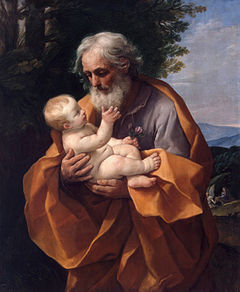St. Joseph's Day
| Feast of Saint Joseph | |
|---|---|

Saint Joseph with the Infant Jesus by Guido Reni, c 1635
|
|
| Observed by |
Catholic Church Anglican Communion Lutheran Church |
| Celebrations | Carrying blessed fava beans, wearing red-coloured clothing, assembling home altars dedicated to Saint Joseph, attending a Saint Joseph's Day parade |
| Observances | Church attendance at Mass or Divine Service |
| Begins | March 19 |
| Date | March 19 |
| Frequency | annual |
Saint Joseph's Day, March 19, the Feast of Saint Joseph is in Western Christianity the principal feast day of Saint Joseph, husband of the Blessed Virgin Mary. He is the foster-father of Jesus Christ. It has the rank of a solemnity in the Roman Catholic Church; Catholics who follow the Missal of 1962 celebrate it as a first class feast. Previous to 1962 it was celebrated as a feast of the rank of double of the first class. It is a feast or commemoration in the provinces of the Anglican Communion, and a feast or festival in the Lutheran Church. Saint Joseph's Day is the Patronal Feast day for Poland as well as for Canada, persons named Joseph, Josephine, etc., for religious institutes, schools and parishes bearing his name, and for carpenters. It is also Father's Day in some Catholic countries, mainly Spain, Portugal, and Italy.
March 19 was dedicated to Saint Joseph in several Western calendars by the 10th century, and this custom was established in Rome by 1479. Pope Pius V extended its use to the entire Roman Rite by his Apostolic Constitution Quo primum (July 14, 1570). Since 1969, Episcopal Conferences may, if they wish, transfer it to a date outside Lent.
Between 1870 and 1955, an additional feast was celebrated in honor of Saint Joseph as Spouse of the Blessed Virgin Mary and Patron of the Universal Church, the latter title having been given to him by Pope Pius IX. Originally celebrated on the third Sunday after Easter with an octave, after Divino Afflatu of Saint Pius X (see Reform of the Roman Breviary by Pope Pius X), it was moved to the preceding Wednesday. The feast was also retitled The Solemnity of Saint Joseph. This celebration and its accompanying octave was abolished during the modernisation and simplification of rubrics under Pope Pius XII in 1955. It is still maintained by Catholics who follow the missals of before then.
...
Wikipedia
